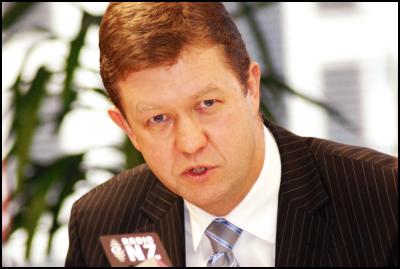Gordon Campbell: The New Immigration Bill
Gordon Campbell: The New
Immigration Bill And The Zaoui
Case

With the unveiling of the new Immigration Bill yesterday, we finally got to see what the Clark government has learned from the Ahmed Zaoui affair : absolutely nothing.
This supposedly centre left government has taken the worst features of its shabby treatment of Zaoui – such as the allegations based on secret information that the appellant has no right to see or challenge, the use of special advocates as camouflage to hide the denial of fundamental human rights, and the invoking of secrecy to hide departmental bungles – and enshrined them as the routine powers to be enjoyed by immigration officials in future. Extreme measures that were invoked only because of the risk Zaoui was alleged to pose to national security will become the norm for how we engage with would-be migrants and refugees.
The proposed extensions of state power bestow enhanced powers of search, entry and detention on immigration officials. They will be able to detain people for up to four hours without warrant, and up to 96 hours without a warrant of commitment. Secret information will now be used in immigration, refugee and security proceedings - and this will not simply be SIS information. It will be anything that the Immigration Service, or the Police or any other agency decree is secret information.
Not only will the appellant have no power to see or challenge it – even the courts, after they have investigated and found the information not to be necessarily kept secret, will then be prevented [ p 165] from disclosing it without the written permission of the agency that originated it. That’s the new way departments get to hide their bungles. They make it illegal, under the law, to disclose them.
What will this secret information entail? Anything from intelligence traffic supplied by foreign intelligence services, to hearsay, gossip and /or malicious falsehoods offered confidentially to the Immigration Service by the appellant’ s business rival or vengeful spouse. The appellant will have utterly no way of telling – and will only be provided a summary of the allegations against him or her, ‘if possible.’ IF POSSIBLE?
Why would it not always be possible to summarise the basis for the allegations ? Perhaps because the allegations were so tawdry and biased that the Immigration Service couldn’t afford to expose them to scrutiny – while being quite happy to reserve its right to use the information behind closed doors.
On this point, the new Immigration Bill doesn’t take us onwards at all from the Zaoui affair. Quite the reverse. It takes us right back to the situation that existed before Zaoui began to launch his legal challenges. As you may recall, the previous SIS Inspector- General Laurie Greig originally denied Zaoui any summary of the SIS allegations against him – so Zaoui thus had to go to court to win that basic right. The High Court resoundingly agreed with him. In December 2003, Justice Williams ruled that Zaoui’s right of access to a summary of the allegations against him was a requirement of natural justice. Today, this hasn’t stopped the government from seeking to weasel out of its obligations, and provide such a summary only ‘ if possible.’

It is
in such moments that the true colours of the Clark
government on security and intelligence issues becomes
apparent. Initially, one of the real foreign policy advances
made by Helen Clark was in refusing to sanction New Zealand
going to war in Iraq. So we broke ranks with our
traditional allies - the US, Britain and Australia – and
decided that our military adventures in future would be the
UN umbrella.
Well, when it comes to security and intelligence, we may as well have invaded Iraq. New Zealand is adopting the same hardline stance on security as those countries that did join the Coalition of the Willing, even though we have not made the same enemies.
You really have to ask – who are we, and what do we fear? Somehow, our immigration and anti-terrorism legislation involves a sacrifice of rights to natural justice that seems utterly out of kilter with the low level of threat that New Zealand faces – especially from say, Islamic fundamentalism. Even the SIS annual reports routinely describe the threat levels faced by New Zealand as being low. We didn’t invade Iraq, and therefore, we don’t have the same enemies. So why are we responding in the same hardline ways as our traditional allies, now reaping the whirlwind sowed by their part in the invasion and subsequent occupation of Iraq?
Many parts of this Bill give rise to concern. The claim by Immigration Minister David Cunliffe that the Bill delivers New Zealand a world class international appeals system and model detention system is patently untrue. In reality, we are extending the use of secret information just as the Canadian courts - earlier this year – have ruled that the use of secret information in refugee cases is an unconstitutional violation of the tenets of natural justice. As long ago as the late 90s, a major refugee case in the US courts [the Kiareldeen case] was being thrown out because the discovery procedure managed to reveal that the secret evidence being relied upon by the FBI had actually been conveyed by an angry estranged spouse. Yet the secrecy entailed with the procedures envisaged in New Zealand in 2007 with this Bill will leave appellants wide open to that sort of injustice.
Similarly, we are in this Bill seeking to extend the use of special advocates. Yet the UK parliamentary committee on human rights reported on July 15 – to cite just one of its several misgivings about the use of special advocates – that ways must be found to enable the advocates to communicate with the appellants AFTER the advocates have been exposed to the secret evidence.
The Immigration Bill has few such qualms. So much for us being a world class act. Instead, on the evidence of this Bill, we seem to be falling behind the rest of the developed world – notably, even behind those countries who are facing genuine terrorist threats that we are not, and who thus have more of an excuse for draconian actions – in striking a just balance between national security and human rights.
Why, we are even proposing to give the Minister the power to deport people just because their presence here might pose a risk to something so vague as our ‘ national reputation.’
The new Bill proposes to scrap the current four independent appellate bodies and combine them into one tribunal. This is payback time.
Payback especially to the Refugee Status Appeals Authority that granted Zaoui refugee status back in August, 2003, and which will now be scrapped. Payback also to the Residence Review Board.
In its annual report to June 2006, the Board allowed 279 out of 635 appeals, or 44 per cent. In 227 of those cases, the Board found the original Immigration Service decision to have been ‘incorrect.’ This relatively high proportion of incorrect decisions by the Immigration Service, the Board noted, “ shows the benefit of an independent appeal.” In passing, such figures also indicate why Immigration Service bureaucrats should not be entrusted with extended powers, and/or the capacity to reach decisions unchallenged, based on secret evidence.
Little reason existed for scrapping the appellate bodies. The time taken for appeals to the Residence Review Board had improved from 17 months to 11.5 months.
The Removal Review Authority faced a declining number of appeals - numbers dropped by 20 per cent between 2005 and 2006 - and it too, was reducing the time it took to process its appeals, 17 per cent of which it upheld, 53 cases in all.
In closing though, I’d like to focus on just one downside of the wholesale transfer of the Zaoui case into our immigration procedures.
You probably know by now just how the special advocate system operates. A special advocate is a lawyer appointed and paid for by the state to challenge the secret evidence on the appellants’ behalf. It offers nothing like a normal lawyer/client relationship. In effect, the special advocate is not allowed to contact his ‘client’ after he has seen the secret evidence, even though the appellant might be the only person able to explain or correct the secret evidence. There are two special advocates appearing in the Zaoui review.
Let me explain why it is unfair to transfer the special advocate innovation into our general immigration processes. With Zaoui, it was bound to be difficult – but not impossible – for the Zaoui defence team to brief the special advocates beforehand on all the stuff they might need to know, in order to rebut the SIS secret evidence. After all, Zaoui’s own odyssey, and the recent political history of Algeria, are pretty well known – and they have been well documented by the Refugee Status Appeals Authority.
Nothing like this though, will apply in the more usual immigration situations. How can a typical refugee or migrant possibly brief a special advocate beforehand – when the secret evidence may be coming from the Immigration Service, or the Police or anyone ( their landlord maybe? ) with an axe to grind. It will be an utterly impossible situation for the appellant, and for the special advocate.
For that reason – and there are similar anomalies elsewhere in the Bill – the legislation will struggle to achieve the goals of providing certainty, and speeding up the process. One piece of good news : the Bill does enshrine the UN Refugee Convention, the Convention Against Torture and the Covenant on Civil and Political Rights. That’s terrific. But then for much of the rest of the Bill, the balance tilts back to bureaucratic convenience, and to allowing the arbitrary exercise of state power. As a result, the contradictions in this situation seem bound to force appellants into asking the courts to defend their rights to natural justice.
That’s what happened in the Zaoui case. Most of Zaoui’s tools to defend his legal rights have been located in the 1951 UN Refugee Convention. Certainly, the state now intends doing its very best to ensure that desperate people coming here in future will never get to qualify for the Refugee Convention’s protections - but New Zealand is a global citizen now, whether it likes it or not. We have formally recognised that people have a right to seek sanctuary here, from torture and persecution.
That’s why in its current form, I think the Bill will force the courts onto a collision course with the Executive. Meaning : more litigation, more uncertainty and more hardship for the vulnerable, as New Zealand gets dragged by the courts, towards something more like international best practice. We may want to be open, fair and compassionate in our dealings with the world beyond our borders. The politicians though, are doing the opposite – with this Bill, they are seeking to entrench some of the worst attitudes and behaviours of the officials within the Immigration Service.
Next : Why Clark has been so hardline on the Zaoui case
 Disclosure : Gordon Campbell
now
Disclosure : Gordon Campbell
now
works as a media officer for the Green Party. He has
been
writing about the Ahmed Zaoui case
since
2003.
ENDS


 Gordon Campbell: Gordon Campbell On Trump’s Tariff Wars
Gordon Campbell: Gordon Campbell On Trump’s Tariff Wars Richard S. Ehrlich: Israel, Hostages, Thailand & Jobs
Richard S. Ehrlich: Israel, Hostages, Thailand & Jobs Binoy Kampmark: Trump, Tariffs And Russia - A Very Muddled Policy
Binoy Kampmark: Trump, Tariffs And Russia - A Very Muddled Policy Gordon Campbell: DeepSeek, And China’s Inexorable Rise
Gordon Campbell: DeepSeek, And China’s Inexorable Rise Martin LeFevre - Meditations: History Is Not A Game
Martin LeFevre - Meditations: History Is Not A Game Peter Dunne: Dunne's Weekly - ACT Looks Backwards
Peter Dunne: Dunne's Weekly - ACT Looks Backwards